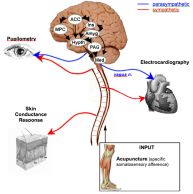|
Brain Mechanisms for Acupuncture-Induced Autonomic Modulation in Chronic Pain.
Project leader: Vitaly Napadow, LicAc, PhD
 Acupuncture has shown promise in relieving certain chronic pain conditions including osteoarthritis (OA) of the knee. However, variability in inter-individual response has been noted and difficulty remains in predicting responders to therapy. Acupuncture is known to modulate autonomic nervous system (ANS) outflow to multiple organ systems. Moreover, the ANS and pain neurocircuitry are intimately linked – pain can induce ANS response, while ANS modulation can, in turn, up- or down-regulate pain processing. However, neither the brain circuitry that controls ANS outflow in humans nor its impact on clinical outcomes is well known. Our past studies have detailed acupuncture modulation of the brain's limbic system and resting connectivity in the sensorimotor and default mode networks. As several limbic structures (e.g. amygdala, hypothalamus) are also components of the brain’s Central Autonomic Network (CAN), we propose that acupuncture can modulate limbic processing to induce characteristic ANS outflow. A phasic ANS response is generated by brain response to acupuncture stimuli, and can feedback to influence sustained post-stimulus ANS outflow and resting brain connectivity. We further propose that the sustained ANS response to acupuncture (parasympathetic dominance) correlates with analgesia in knee OA patients. Our proposal will explore the relationship between acupuncture-induced brain response and ANS outflow in both healthy controls (Aim 1) and knee OA patients (Aim 2). We will non-invasively localize brain regions associated with acupuncture-induced ANS modulation using multi-modal integration of functional MRI (fMRI) with ANS monitoring (SCR, HRV, pupilometry). This study will provide important insight into acupuncture mechanisms for clinical efficacy in knee OA. Acupuncture has shown promise in relieving certain chronic pain conditions including osteoarthritis (OA) of the knee. However, variability in inter-individual response has been noted and difficulty remains in predicting responders to therapy. Acupuncture is known to modulate autonomic nervous system (ANS) outflow to multiple organ systems. Moreover, the ANS and pain neurocircuitry are intimately linked – pain can induce ANS response, while ANS modulation can, in turn, up- or down-regulate pain processing. However, neither the brain circuitry that controls ANS outflow in humans nor its impact on clinical outcomes is well known. Our past studies have detailed acupuncture modulation of the brain's limbic system and resting connectivity in the sensorimotor and default mode networks. As several limbic structures (e.g. amygdala, hypothalamus) are also components of the brain’s Central Autonomic Network (CAN), we propose that acupuncture can modulate limbic processing to induce characteristic ANS outflow. A phasic ANS response is generated by brain response to acupuncture stimuli, and can feedback to influence sustained post-stimulus ANS outflow and resting brain connectivity. We further propose that the sustained ANS response to acupuncture (parasympathetic dominance) correlates with analgesia in knee OA patients. Our proposal will explore the relationship between acupuncture-induced brain response and ANS outflow in both healthy controls (Aim 1) and knee OA patients (Aim 2). We will non-invasively localize brain regions associated with acupuncture-induced ANS modulation using multi-modal integration of functional MRI (fMRI) with ANS monitoring (SCR, HRV, pupilometry). This study will provide important insight into acupuncture mechanisms for clinical efficacy in knee OA.
|

